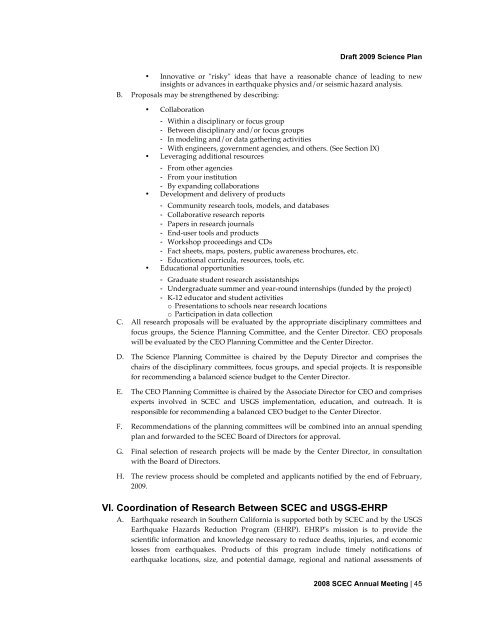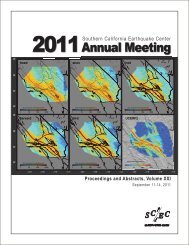Annual Meeting - SCEC.org
Annual Meeting - SCEC.org
Annual Meeting - SCEC.org
- TAGS
- annual
- meeting
- www.scec.org
You also want an ePaper? Increase the reach of your titles
YUMPU automatically turns print PDFs into web optimized ePapers that Google loves.
Draft 2009 Science Plan<br />
• Innovative or "risky" ideas that have a reasonable chance of leading to new<br />
insights or advances in earthquake physics and/or seismic hazard analysis.<br />
B. Proposals may be strengthened by describing:<br />
• Collaboration<br />
- Within a disciplinary or focus group<br />
- Between disciplinary and/or focus groups<br />
- In modeling and/or data gathering activities<br />
- With engineers, government agencies, and others. (See Section IX)<br />
• Leveraging additional resources<br />
- From other agencies<br />
- From your institution<br />
- By expanding collaborations<br />
• Development and delivery of products<br />
- Community research tools, models, and databases<br />
- Collaborative research reports<br />
- Papers in research journals<br />
- End-user tools and products<br />
- Workshop proceedings and CDs<br />
- Fact sheets, maps, posters, public awareness brochures, etc.<br />
- Educational curricula, resources, tools, etc.<br />
• Educational opportunities<br />
- Graduate student research assistantships<br />
- Undergraduate summer and year-round internships (funded by the project)<br />
- K-12 educator and student activities<br />
o Presentations to schools near research locations<br />
o Participation in data collection<br />
C. All research proposals will be evaluated by the appropriate disciplinary committees and<br />
focus groups, the Science Planning Committee, and the Center Director. CEO proposals<br />
will be evaluated by the CEO Planning Committee and the Center Director.<br />
D. The Science Planning Committee is chaired by the Deputy Director and comprises the<br />
chairs of the disciplinary committees, focus groups, and special projects. It is responsible<br />
for recommending a balanced science budget to the Center Director.<br />
E. The CEO Planning Committee is chaired by the Associate Director for CEO and comprises<br />
experts involved in <strong>SCEC</strong> and USGS implementation, education, and outreach. It is<br />
responsible for recommending a balanced CEO budget to the Center Director.<br />
F. Recommendations of the planning committees will be combined into an annual spending<br />
plan and forwarded to the <strong>SCEC</strong> Board of Directors for approval.<br />
G. Final selection of research projects will be made by the Center Director, in consultation<br />
with the Board of Directors.<br />
H. The review process should be completed and applicants notified by the end of February,<br />
2009.<br />
VI. Coordination of Research Between <strong>SCEC</strong> and USGS-EHRP<br />
A. Earthquake research in Southern California is supported both by <strong>SCEC</strong> and by the USGS<br />
Earthquake Hazards Reduction Program (EHRP). EHRP's mission is to provide the<br />
scientific information and knowledge necessary to reduce deaths, injuries, and economic<br />
losses from earthquakes. Products of this program include timely notifications of<br />
earthquake locations, size, and potential damage, regional and national assessments of<br />
2008 <strong>SCEC</strong> <strong>Annual</strong> <strong>Meeting</strong> | 45



